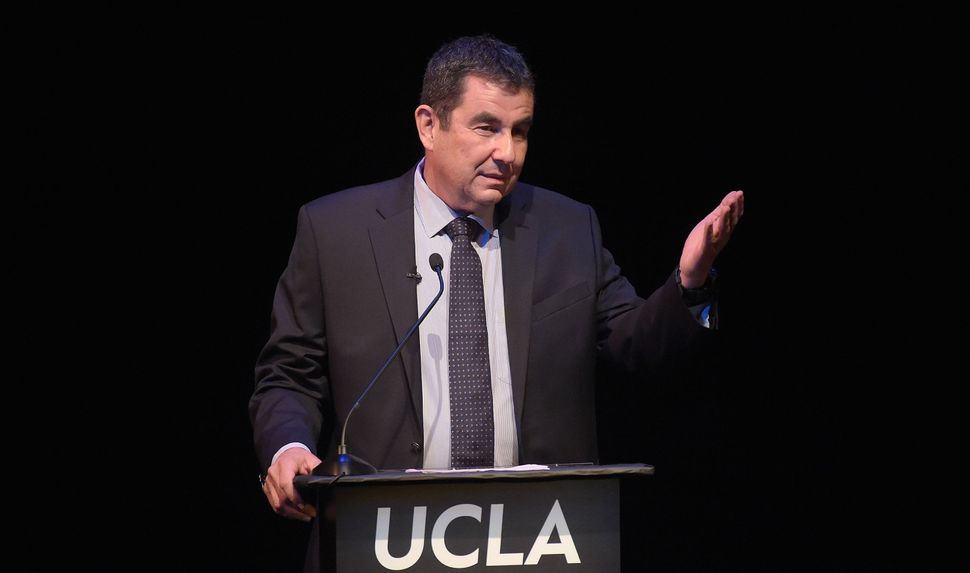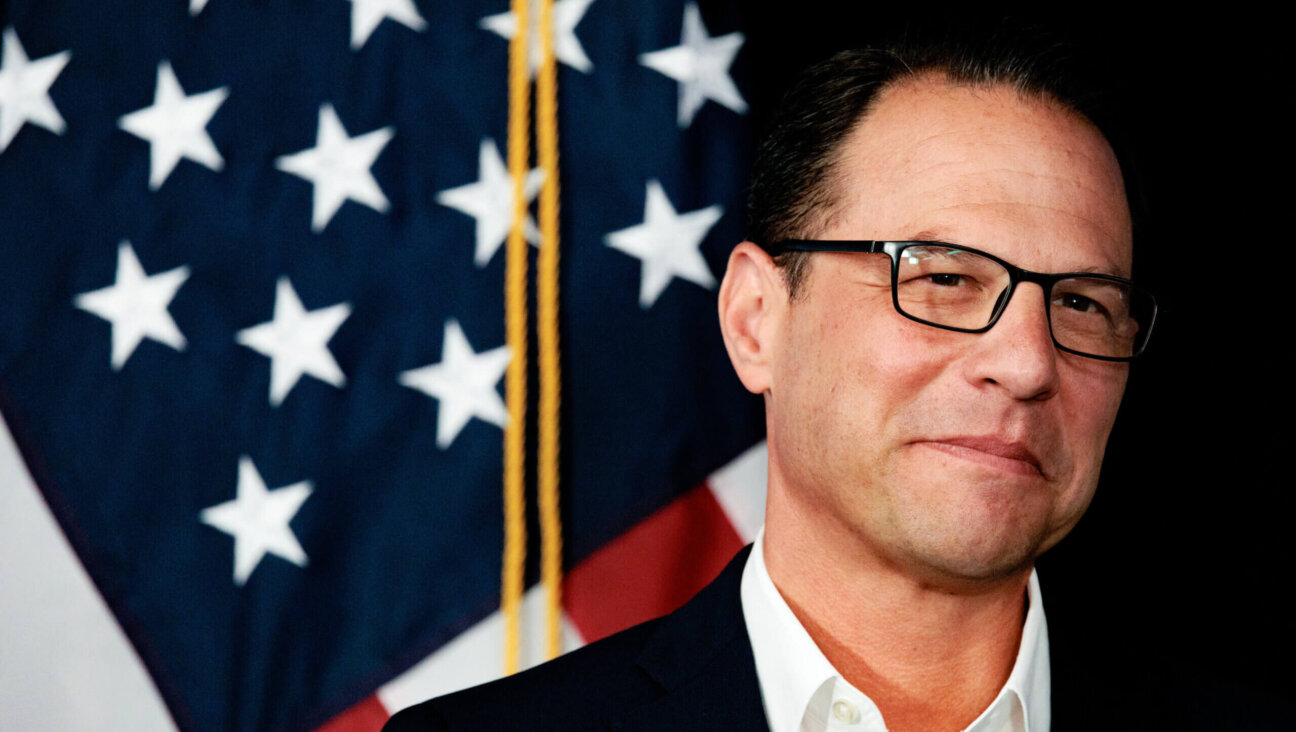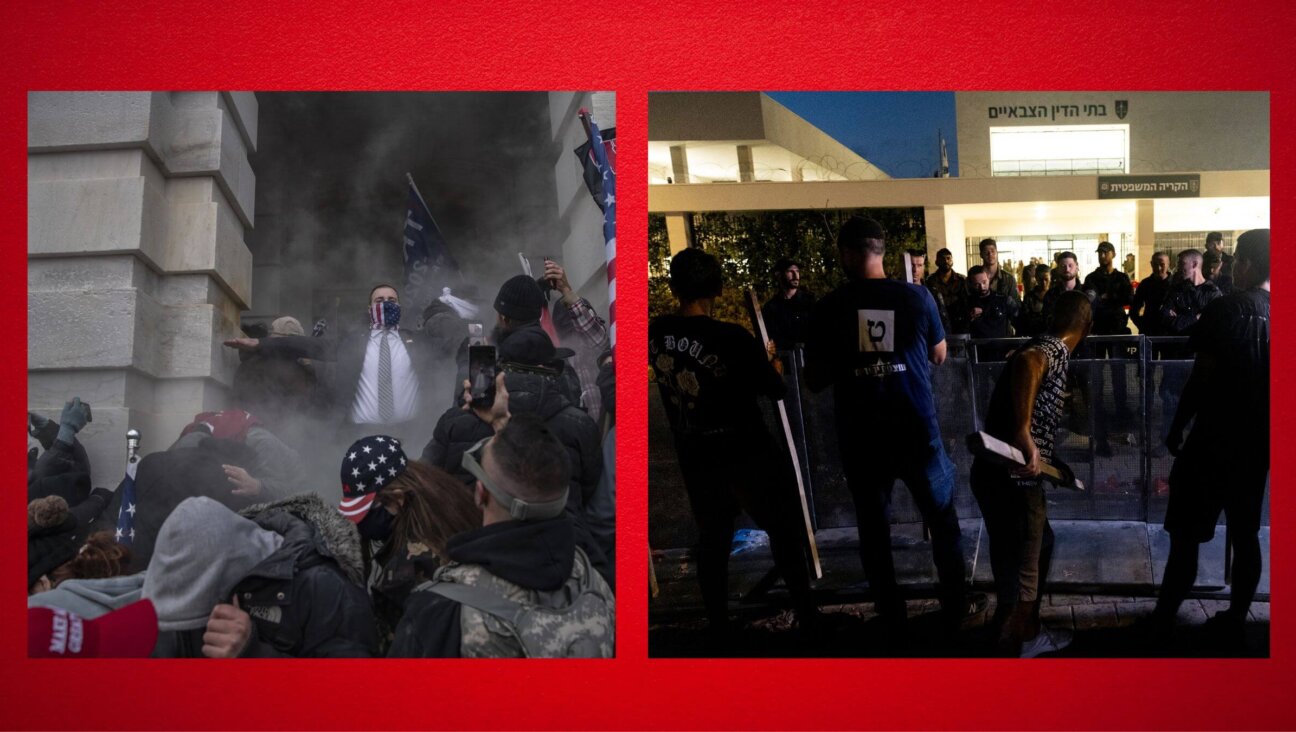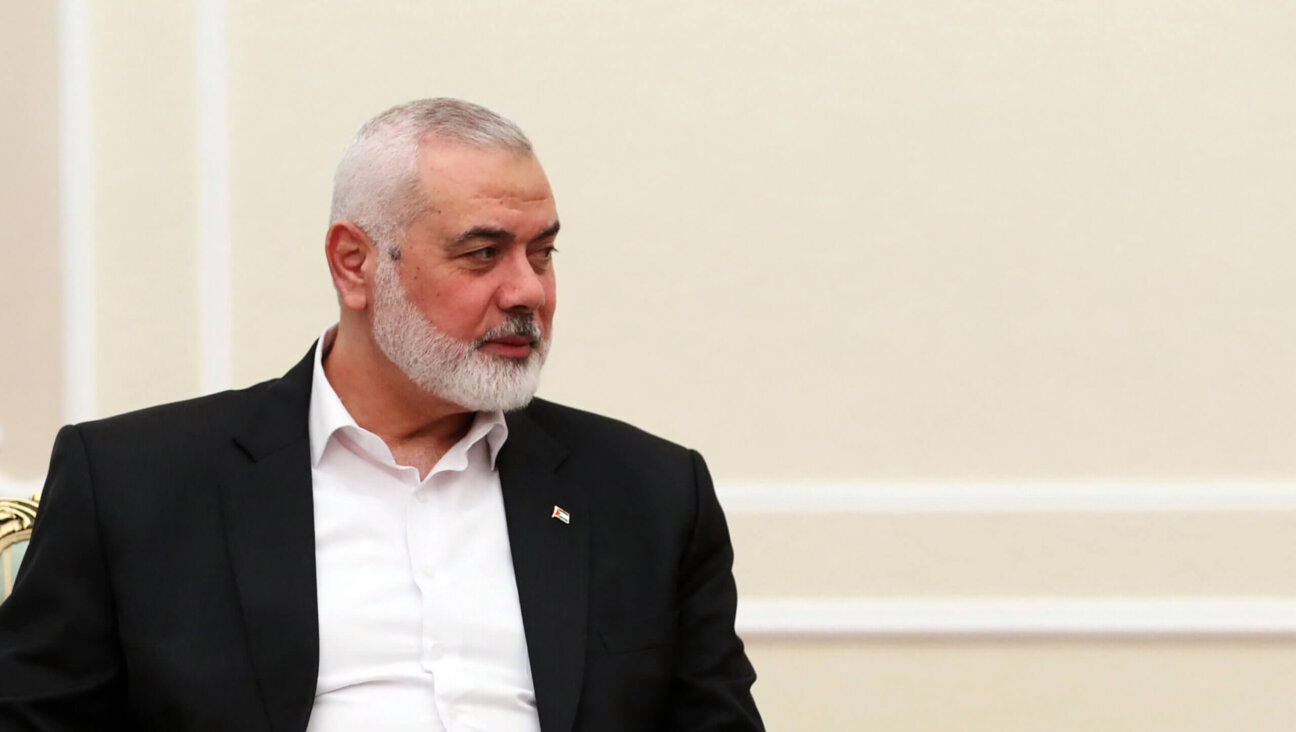Ari Shavit, Go Away and Don’t Come Back

Ari Shavit, prior to his ‘journey of Tikkun’ Image by Getty Images
It’s been eight months since dozens of accusations of sexual assault by Harvey Weinstein kicked off the #MeToo movement. As the dust begins to settle some men are coming forward, making clear that they feel it is just about time they were forgiven.
Mario Batali, the chef who was accused of numerous counts of sexual misconduct and assault, is reportedly considering staging his redemption by “creating a new company led by a powerful woman chief executive.” Comedian Louis CK, who admitted to cornering female comedians and masturbating in front of them, is thought to be planning a return via small comedy clubs.
A third appeared in Haaretz today, in a 3,861-word interview: disgraced journalist and public speaker Ari Shavit.
Shavit’s crimes preceded the #MeToo movement by a few years. He was the subject of an article by Jewish journalist Danielle Berrin describing a sexual assault in 2016, when she alleged that a prominent journalist grabbed her and tried to kiss her and proposition her for sex during an interview.
Shavit acknowledged that he was the unnamed writer in Berrin’s piece and claimed not to have assaulted her, saying that he viewed the interaction as “flirtation” and apologized deeply for the “misunderstanding.”
When a second, unnamed woman came forward with another harassment accusation, Shavit resigned from his position at Haaretz and Israel’s Channel 10 news. But determined to return to the public eye, Shavit resurfaced in December 2017; he had been invited to host a talk at the 92nd Street Y in Manhattan. The talk was cancelled when two more young women came forward and said that Shavit had made inappropriate sexual advances on them.
Now, in an interview with Israeli intellectual Orit Kamir titled “Ari Shavit: I Was Blind to the Power I Had as a Privileged White Man,” Shavit is attempting to re-gain the public’s trust and return to his plum position as a thinker, writer, and lecturer.
“I made a terrible mistake,” Shavit tells Kamir. “I was inattentive, and I completely misread the situation.”
He describes the teshuvah he has done — speaking with his wife, his daughter, and even Berrin herself. He’s changed, he says. He was a “late bloomer.” He tried to “climb too many mountains.” But at the end of the day he is a “humanist” and has “faith in the human spirit.”
He’s a proud feminist, he insists. His ability to speak about his mistakes and many trials shows that “there is light at the end of the tunnel.” Ari Shavit, apparently, is that light.
The entire interview might as well be made out of avocado for the way it seems designed to appeal to the #MeToo generation. But a closer reading in light of the events that led up to it shows Shavit’s duplicity. Even as he announces, “I am not forgoing my narrative” he forgoes mentioning that three other women have come forward accusing him of sexual assault or harassment. Even as he professes having done ample teshuva, including reaching out to Berrin, he fails to mention the op-ed she published in the Times in December 2017 stating that she does not forgive him.
“Men like Mr. Shavit would do well to remember that a true apology would not make excuses or justify bad behavior,” she writes, “but would take full responsibility for what went wrong.”
Erasing Berrin’s own words is par for the course in a piece that fails to own up to Shavit’s actual crime. Specifically, he has not apologized for what he has been accused of by Berrin: sexual assault.
In every grease-dripping comment of his in Haaretz, Shavit claims atonement while simultaneously undermining Berrin’s story about why he should atone in the first place.
“How could this have happened?” he ponders of his interaction with Berrin. “How is it possible that a woman was intimidated in my presence?” he asks, as if Berrin accused him of intimidating her, rather than forcibly trying to kiss her in a work environment.
Each sentence begs forgiveness for his crimes while rewriting the charges against him. “I didn’t recognize the power my career had given me,” Shavit laments, sounding coached. “And I didn’t internalize the responsibility inherent in this power,” he adds, again neglecting to mention Berrin’s charges that he “continued to pull and paw” at her as she tried to get away.
Shavit’s ability to proclaim his adoration for Berrin – “I admire her courage and fortitude” – while never acknowledging her actual experience is sneaky. His claim that he has undergone a total reckoning concerning gendered power dynamics and announcement of fealty to the #MeToo movement is eroded by the fact that he never acknowledges the three other women who have also gone on record anonymously reporting that he harassed them.
He uses lingo ripped from a gender studies textbook, like how he’s learned to see himself as a “privileged white man,” to endear himself to women of the age and milieu of those he is accused of wronging without acknowledging those women.
“Certain people with certain personal, political and partisan agendas, were manipulating the situation in order to get rid of me,” this purported feminist writes.
Deftly, insidiously, he paints himself as a victim of #MeToo.
Shavit’s treacly, gruesomely self-flagellating, and duplicitous narrative proves that he is only sorry he’s in trouble, not that he’s sorry for the many women whose lives he has hurt.
Even Shavit’s interviewer rewrites history to minimize Shavit’s crimes in the introduction to the interview.
Kamir writes that “the encounter ends without incident,” which is patently false; both Shavit and Berrin agree that the night contained a major incident – in Shavit’s narrative “inappropriate behavior,” in Berrin’s “sexual assault.” Kamir also says that Berrin “describes in her newspaper his belligerent and coarse behavior toward her that evening” which is erroneous — Berrin describes Shavit lunging, grabbing her head, and sexually propositioning her. The title of Berrin’s article is “My Sexual Assault, and Yours: Every Woman’s Story.”
The minimization of the violence of the crimes Shavit is accused of leaks from his own self-justification to the framing narrative of the Haaretz piece. This is unacceptable.
Shavit doesn’t need to come back. He can do complete teshuva without reinserting himself in the public sphere as an expert and celebrated intellectual.
He has the moral obligation to apologize for his actions and work to understand them. But a return to acclaim and power, which is what he appears to be aiming for here, is not a right; it is a privilege. And it is one self-respecting Jews should deny him.
We, the public, need to let Shavit do teshuva and rejoin the world as a private citizen; he could do great work as a teacher, perhaps, or a librarian. Perhaps he could find work counseling men like himself. But he has exempted himself from celebrity status by proving that he is incapable of the responsibly of holding that position.
Shavit owes Danielle Berrin and any other women he harmed a true apology. But we do not owe Ari Shavit a position in the spotlight as an intellectual leader.
Jenny Singer is the deputy lifestyle editor for the Forward. You can reach her at [email protected] or on Twitter @jeanvaljenny





















